#charles guiteau
Explore tagged Tumblr posts
Text




you wanna shoot a ponydent ?
#meshi art#assassins#assassins musical#mlp#mlp art#mlp fim#charles guiteau#john wilkes booth#leon czolgosz#its funny i thought guiteau was kind of annoying in the show but draw him as a pony and now it all makes sense
129 notes
·
View notes
Text
By the way, all the awful shit that happened today was in the first twelve hours of Trump's Presidency.
He has his first full day as President tomorrow when I'm assuming he will pardon John Wilkes Booth and Charles Guiteau (but not Leon Czolgosz since he inexplicably loves President McKinley because "tariff ") and put Jefferson Davis on the $5 bill.
#Donald Trump#President Trump#Trump Administration#Inauguration Day#Inauguration of Donald Trump#Trump Inauguration#Presidential Inauguration#John Wilkes Booth#Charles Guiteau#Leon Czolgosz#William McKinley#President McKinley#Jefferson Davis
66 notes
·
View notes
Text




silly dump🥰
Add a translation of p3, just some headcanon
#musical#assassins musical#lynette fromme#sara jane moore#john wilkes booth#john hinckley#lee harvey oswald#leon czolgosz#charles guiteau
94 notes
·
View notes
Text

photoshopped joke from @archiesweirdparody
67 notes
·
View notes
Text
girl there was no reason to do all that
37 notes
·
View notes
Text
Did I mention I was a US History fan? Happy Presidents Day!
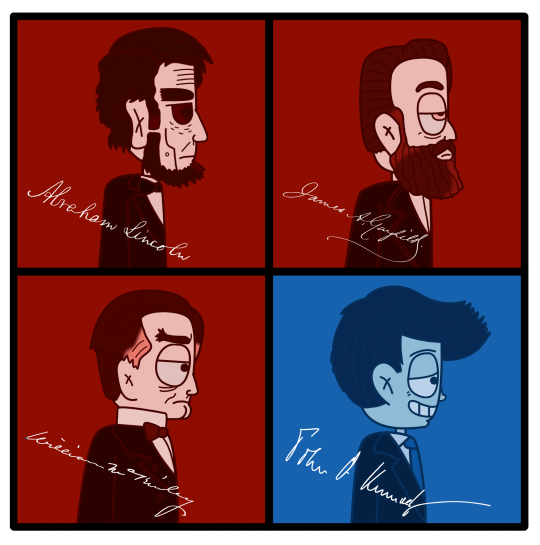
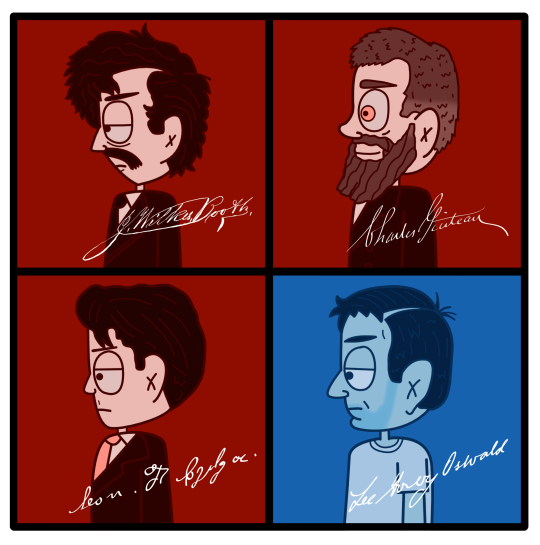
#my art#presidents day#us history#us presidents#american president#american history#potus#abraham lincoln#James a garfield#james garfield#james abram garfield#william mckinley#jfk#john f kennedy#john fitzgerald kennedy#john wilkes booth#charles guiteau#charles j guiteau#charles julius guiteau#leon czolgosz#leon frank czolgosz#lee harvey oswald#gorillaz#never listened to them but i sort of referenced them#historical figures
29 notes
·
View notes
Text
-be me
-be in history class
-charles guiteau is mentioned
-let out an audible gasp.
-be forever dissapointed in yourself because how the fuck am i supposed to explain that i know him because he's my favorite presidential assassin in a steven sondheim musical
-never! i would never admit to that! im a NERD god fuck my life
#charlieeeeee guiteauuuu never said never or heard the word no#assassins#assassins musical#stephen sondheim#sondheim#charles guiteau
39 notes
·
View notes
Text
drawing of the 4 successful assassins

hooray
#assassins#assassins musical#assassins fanart#stephen sondheim#john wilkes booth#charles guiteau#leon csolgosz#lee harvey oswald#leon czolgosz
45 notes
·
View notes
Text

140 notes
·
View notes
Text
How old each of the assassins in the musical were when they committed their assassination or attempt:
Arthur Bremer: 21
Lee Harvey Oswald: 24
Sirhan Sirhan: 24
John Hinckley jr.: 25
John Wilkes Booth: 26
Lynnette “Squeaky” Fromme: 26
Leon Czolgosz: 28
Guiseppe Zangara: 33
Charles Guiteau: 39
James Earl Ray: 40
Samuel Byck: 44
Sara Jane Moore: 45
#assassins musical#arthur bremer#lee harvey oswald#sirhan sirhan#John hinckley jr#john wilkes booth#squeaky fromme#leon czolgosz#guiseppe zangara#charles guiteau#james earl ray#Samuel byck#sara jane moore
24 notes
·
View notes
Note
you're having a party, which presidents are you inviting?

Good question, very fun. I'll invite all of the ones I like, and whichever ones I'd like to see in a party setting.
James Madison is chronologically the first that I would invite. I think it'd be funny to see him at a party. I think of "nearly gets trampled on the dance floor..." I, myself, will trample him unless he brings Dolley.
Jackson is invited and I hope he leaves cheese around the house in secret spots like he did at the end of his presidency.
Van Buren is invited unless @presidenttyler continues to insist that I have to marry him or he'll summon a deadly fog (please die, Mr. Tyler.)
I would invite William Henry Harrison, but tragically, as I'm sure we've all heard, he is no longer with us </3.
John Tyler is invited unless he tries to insist I marry Martin Van Buren lest a deadly fog be summoned. Also I swear to God he's not allowed to use my bathroom. I hope he and Jackson start fighting (no weapons allowed in my house) and I get to see their skinny bones fall out.
James K Polk is invited. I want him to bring his Lady Presidentress as well. Double invited if he is the presidentress.
Zachary Taylor is invited. His daughter can come too. His daughter's husband cannot come. His daughter's husband's dog, Bonin, can come. The murderer who shares a name with Zachary Taylor's daughter's husband's dog cannot come.
Millard Fillmore is invited. He can bring the whole boiler room with him. It wouldn't be a party without him.
Franklin Pierce is invited, of course. As an old @/deadpresidents posts that I can longer find clarifies, he would indeed be a welcome party guest, even if people on Reddit don't seem to think so (I have beef with 90% of reddit tier lists, save for any of them made by @starlight-tequila.) As I've come to understand, there're no less than 4 fictional interpretations of Pierce where he's being haunted. I request he keeps the haunting at home; I don't want the watchmojo demmons to mess up the vibe.
James Buchanan is invited. I want to see him in his worst outfit, behaving as he did at Dickinson before his expulsion. He needs to bring Harriet too. WRK too, unless I decide that he's also dead.
Andrew Johnson can come because I once saw an image of him smiling.
Ulysses Grant can come. He may play with the non dog animals (unfortunately, they're all just different Martin Van Buren government assigned rodentsonas in a pen.)
As can Hayes. Hayes can bring his wife, Lucy. She actually allowed drinking in the White House on special occasions, so she would not be a party pooper.
Garfield may come, but only as Lucretia's plus one. It's what he deserves. Since Guiteau did so much for Garfield's election (and was basically the president, let's be real, guys) he can come as an honorary president. So can David Rice Atchison, even though that story is complete bs. Dr. Doctor Bliss will be shot on sight by Boston Corbett.
Arthur is invited, but Julia Sand needs to pre-approve everything that he does. Conkling may come as a plus one, but he will go in the pen with the Martin Van Buren government assigned rodentsonas (it's okay, that's where Grant is anyway.)
On no other day would I ever allow Benjamin Harrison and his shortness within my sight, but I just found a song about him and it's stuck in my head, so I think it's only right that he attends 1 single time before my kind feelings toward him dry out.
McKinley is invited. He must sing to me.
Wilson is invited. But I will lock him in a room like a creature. You-know-who gets the key. The second female president, Edith Wilson, may attend.
Warren Harding gets to come. Gaston Means may, as well. Also Calvin Coolidge and Herbert Hoover. That's about it. If Nixon were to show up I wouldn't turn him away.
I'd like the party to end by sending an anonymous tip to Carrie A. Nation, telling her there is alcohol. She can come in, destroy everything, and all's well because if everything is destroyed, there's nothing to clean. She and Guiteau can ride into the sunset, combining to be a person of a normal height. I hope they invite me to the wedding.
#(“demon” intentionally misspelled)#sorry this took me so long to reply to#james madison#jaxler#I want to give Jackson a lesson in Gen Alpha slang#matty van#william henry harrison#babycakes tyboy#james k polk#first ladies#zachary taylor#millard fillmore#franklin pierce#james buchanan#ulysses grant#Rutherford hayes#james garfield#charles guiteau#chester arthur#william mckinley#woodrow wilson#edith wilson#warren harding#calvin coolidge#herbert hoover#richard nixon#acctag: presidents#effort posts#asks
33 notes
·
View notes
Text
The Elegant Mr. Arthur
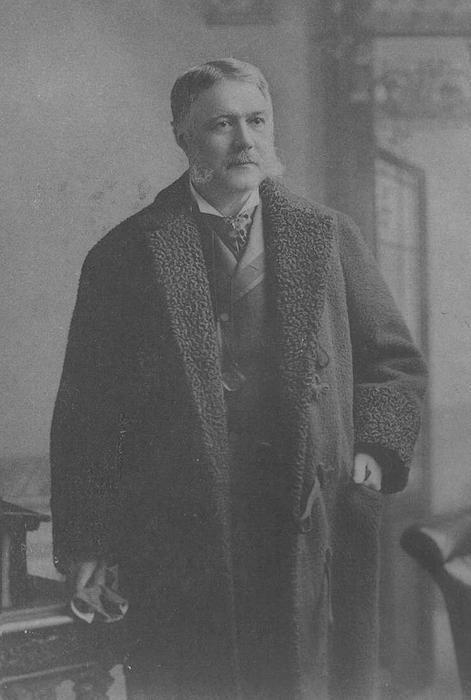
It was about two hours after midnight on September 20, 1881, and not unusual for the resident of 123 Lexington Avenue in New York City to be up at such a late hour, or to have plenty of guests. In fact, he preferred to keep late hours, entertaining friends deep into the night with late-night dinners, drinks, and endless conversation. Yet, on this night, 123 Lexington Avenue was somber and the mood was grave. Just a few hours earlier -- at 11:30 PM -- a messenger knocked on the door of Vice President Chester Alan Arthur's Manhattan brownstone and handed Arthur a telegram. Surrounded by a few friends and colleagues, Arthur read that President James A. Garfield, just 49 years old and in office for barely six months, had died in a beach cottage at Elberon, New Jersey. Turning to his friends in his sitting room, Arthur said, "I hope -- my God, I do hope it is a mistake."
On July 2nd, President Garfield was shot twice and seriously wounded by Charles Guiteau as he walked through the Baltimore & Potomac Railroad Station in Washington, D.C. with Secretary of State James G. Blaine and Secretary of War Robert Todd Lincoln (son of Abraham Lincoln) en route to a speaking engagement at his alma mater, Williams College in Massachusetts. Guiteau was a disgruntled, disturbed, and delusional office-seeker who had been pleading for an appointment as consul to Paris (though he was willing to "settle" for Vienna) despite an absence of diplomatic and political experience and a complete lack of general qualifications. Hounding Garfield throughout the early months of an Administration that had just begun on March 4, 1881, Guiteau's constant harassment of the new President finally resulted in Secretary Blaine to never return to the White House again. Guiteau felt that he had been entitled to some office, particularly an ambassadorship, and was terribly upset that Garfield and his Cabinet members refused to consider his requests. Blaine's order to stay away drove Guiteau to purchase an ivory-handled .44 British Bulldog revolver (specifically chosen because Guiteau felt that particular firearm would look good in a museum) and he began stalking Garfield throughout Washington before finally shooting him inside the rail station two days before Independence Day 1881. As police arrested him, Guiteau shouted, "I am a Stalwart of the Stalwarts...Arthur is President now!"
But Arthur wasn't President; not yet at least. Garfield was a physically robust man and relatively young in comparison to most Presidents to date. While one bullet had lodged in Garfield's spine, the other bullet grazed his arm and caused no significant damage. While it appeared that he was gravely ill immediately following the shooting, Garfield's vital signs soon started to improve and the American people began to get their hopes up about a full recovery. A vigil of sorts was underway as President Garfield convalesced in the White House, and his doctors issued regular bulletins updating his condition. Garfield's doctors also poked and prodded him with unsterilized instruments and dirty fingers to attempt to locate the bullet still inside of his body. Had they left it alone, Garfield almost certainly would have survived; his wounds were significantly less dangerous than those survived 100 years later by 70-year-old Ronald Reagan. However, the unnecessary poking and prodding resulted in a serious infection that ravaged Garfield's body, weakened his heart, left the muscular, 215-pound President emaciated, weighing less than 135 pounds, and turned the 49-year-old Garfield's dark brown beard and hair a ghastly white color. Fighting for his life in the sweltering summer heat of Washington, on September 6th it was finally agreed upon to transport Garfield to a cottage on the Jersey Shore in hopes that he could benefit from the change of scenery and from the fresh ocean air. Sadly, it was too late. The infections were accompanied by blood poisoning and pneumonia, among other ailments. On September 19th at 10:35 PM, Garfield suffered a massive heart attack and was pronounced dead. An hour later the messenger arrived at 123 Lexington Avenue.
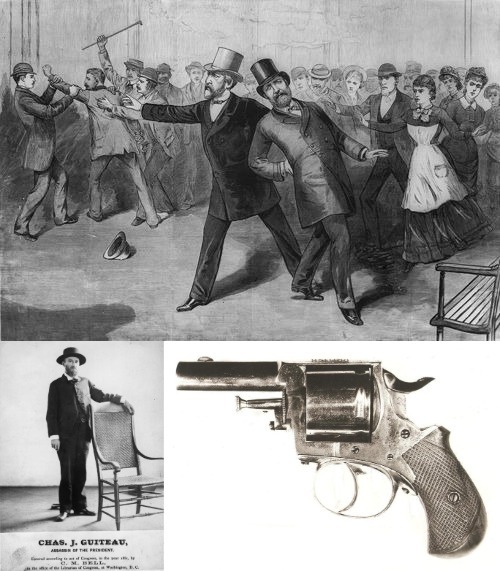
•••
The Vice Presidency was a stretch. Chet Arthur of New York as Vice President? When offered the Republican Vice Presidential nomination by James Garfield in 1880, Chester Arthur was urged by his political mentor and close friend, Stalwart leader Roscoe Conkling, to decline the appointment. Arthur, a man who had never spent a day in Congress or been elected to any office at any level, went against Conkling's wishes for perhaps the first time in his life. The Vice Presidency was certainly a stretch, but President of the United States? That was an almost frightening thought to a nation still recovering from Civil War and desperately seeking civil service reform, especially now that a disgruntled office-seeker had assassinated the President. Arthur was President left a lot of Americans worried -- some because Arthur's political background was as the powerful and somewhat shady Collector of the Port of New York, appointed during the corrupt Administration of President Ulysses S. Grant and eventually fired by President Rutherford B. Hayes during a housecleaning of corrupt institutions; and some because James Garfield's murderer had claimed to be a Stalwart and, by his own words, insinuated that Garfield's shooting might be a conspiracy on behalf of the Conkling/Arthur side of the divided Republican Party.
Chester Arthur was a creature of the era known as the "Gilded Age" and was the symbolic mascot for the widespread political corruption of the 1870s due to his position at the Port of New York. At a moment when drastic reform of the civil service was being demanded by many Americans outraged by James Garfield's assassination, Garfield's successor was a man who, for years, had been the poster boy for crony patronage and machine politics. Born in Vermont in 1829, Arthur was the son of a preacher and grew up mostly in upstate New York, graduated from Schenectady's Union College in 1848, briefly taught school while studying law, and was admitted to the bar in 1854. As his law practice grew in the 1850s, Arthur immersed himself in New York Republican politics yet never ran for office. A political appointee to the New York State Militia, he found himself serving during the Civil War and his superb organizational skills led to quick promotions all the way to quartermaster general in 1862, a position which carried the rank of brigadier general. As a political appointee to the militia, however, Arthur served at the pleasure of the Governor of New York and was forced to resign in 1862 when a Democratic Governor took office. Returning to New York City, Arthur resumed his law practice and political gamesmanship. More appointments came his way as he supported Republican candidates throughout the state and worked on national campaigns such as President Lincoln's 1864 bid for re-election and Ulysses S. Grant's 1868 Presidential campaign.
In 1871, President Grant appointed Arthur as Collector of customs as the Port of New York, which gave Arthur responsibility for about 75% of the nation's custom duties and was one of the most powerful patronage positions available in the United States government. Arthur used his office to efficiently raise money for Republican campaigns and candidates, supporting President Grant's 1872 re-election campaign by seeking (if not "requiring") contributions from his employees at the customhouse. In 1876, Arthur championed his political mentor, Senator Roscoe Conkling, for the Republican Presidential nomination, but supported Rutherford B. Hayes in the general election, once again using the employees at the customhouse to help raise money to finance the successful Republican campaign. However, once Hayes was elected, the new President made it clear that he was serious about civil service reform and that meant reforming Arthur's customhouse, too. In 1877, Arthur testified before the Jay Commission, which was formed to investigate charges of corruption and eventually recommended that President Hayes reduce the workforce of the customhouse and eliminate the corrupt elements that had worked there for so long. Due to Arthur's longtime support of the Republican Party, President Hayes offered him an appointment as consul in Paris (the same job Charles Guiteau would kill James Garfield for a few years later) in order to quietly remove him from the Port of New York. When Arthur refused the appointment, the President fired him and Arthur resumed his law practice in New York City.
When Arthur headed to the 1880 Republican National Convention at the Interstate Exposition Building in Chicago, it was as a New York delegate supporting the aspirations of former President Ulysses S. Grant who was coming out of retirement to seek an unprecedented third term. However, neither of the front-runners for the nomination -- Grant and Senator James G. Blaine of Maine -- could capture enough votes from delegates to clinch the nomination. After thirty-five ballots, Blaine and another prospective candidate, Treasury Secretary John Sherman of Ohio, threw their support behind a dark horse candidate -- Ohio Congressman James A. Garfield. On the next ballot, Garfield clinched the nomination and reached out to the opposing wing of the Republican Party for his Vice Presidential choice. The first choice, Levi P. Morton of New York (who would later serve as President Benjamin Harrison's Vice President), declined Garfield's offer, and Arthur -- who had never previously even sought an elective office -- excitedly accepted, much to the chagrin of his angry political mentor, Roscoe Conkling. Not confident in Garfield's chances for election, Conkling told Arthur, "You should drop it as you would a red-hot shot from the forge." Arthur replied, "There is something else to be said," and Conkling asked in disbelief, "What, sir, you think of accepting?". Despite the complaints and anger of Conkling, Arthur told him, "The office of Vice President is a greater honor than I have ever dreamed of attaining. I shall accept. In a calmer moment you will look at this differently."
Following the election, Arthur prepared to settle into the quiet role of Vice President during the 19th century. The Vice President of the United States has only one real responsibility -- to preside over the Senate and even that responsibility is normally delegated to Senators who rotate as presiding officer almost daily. The powerful or even influential American Vice Presidency is a fairly recent evolution, not even 50 years old. While some Vice Presidents were relied on for advice or counsel or given larger duties than others, most Vice Presidents were so far removed from the Executive Branch that they were not only kept out of the decision-making process, but also kept in the dark about certain information. For example, when President Franklin D. Roosevelt died towards the end of World War II in 1945 and was succeeded by his Vice President, Harry S. Truman, the new President had to be quickly briefed about the existence of the Manhattan Project to develop atomic weaponry. Still, the first Vice President to have an office in the White House was Walter Mondale and that didn't occur until 1977, so in 1881 a Vice President was expected to preside over the Senate on special occasions, cast a tie-breaking vote when necessary, and be available to take the oath of office if the President happened to die or resign.
Like most 19th century Vice Presidents, Chester Arthur didn't even spend much time in Washington, and he was returning to his regular home in New York City on July 2, 1881 when he stepped off a steamship with Roscoe Conkling and was told that President Garfield had been shot. In fact, the message that Arthur received first erroneously reported that Garfield was already dead and at the request of Garfield's Cabinet, the stunned Vice President immediately returned to Washington, D.C. to proceed with the next steps necessary for maintaining the continuity of government. When Arthur arrived in Washington, President Garfield's condition had improved and his recovery continued to show signs of promise as the Vice President and the nation prayed for him and held vigil throughout the summer. Shaken by rumors that he and his "Stalwart" wing of the Republican Party conspired to assassinate Garfield, Arthur returned home to New York City, hesitant to invite criticism that his continued presence in Washington was merely an eager deathwatch so that he could grab power.
Garfield clung to life for eighty excruciating days with doctors probing him in an effort to remove the bullet in his body, causing infections and leaving the President suffering from blood poisoning which led him to hallucinate at times. The Navy helped rig together an early form of air conditioning in Garfield's White House sickroom in order to give him relief from Washington's stifling summer conditions. When Garfield was taken by train to New Jersey in early-September, it was clear to many that the long vigil was nearly over. More infections set in, along with pneumonia and painful spasms of angina. When the messenger arrived at 123 Lexington Avenue just before midnight on September 20, 1881 to inform Arthur that President Garfield had died just 60 miles away, the new President wasn't surprised, but he also wasn't quite prepared. The nation worried about the lifetime political operative stepping into the position being vacated by the promising President assassinated before he could enact the civil service reforms promised in his Inaugural Address. What would Arthur -- the quintessential patronage politician -- do as President? Nobody knew, but Chester Alan Arthur had an idea. •••
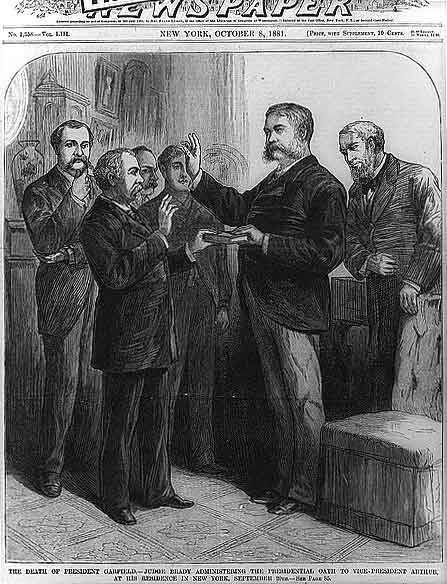
It was fitting that Arthur was surrounded by friends when he took the oath of office at his home in Manhattan at 2:15 AM on September 20, 1881. Arthur's beautiful wife, Nell, died of pneumonia in January 1880 and he was inconsolable for months, regretting for the rest of his life the fact that she never saw his election as Vice President or ascendancy to the Presidency. People who knew Arthur stated that he clearly never fully recovered from her death, and that as a "deeply emotional...romantic person," it was no surprise that he ordered that fresh flowers were placed before her portrait in the White House every day while he was President.
Chester Arthur had a lot of friends. That's what happens when you control as many lucrative patronage positions as Arthur controlled for as long as Arthur controlled them. But it wasn't just his political position that gained him friends. Arthur was a great storyteller, a man who loved to hunt and fish, kind, easy-going, charming, graceful, and smooth. During his life he was nicknamed "Elegant Arthur" and is considered one of the most stylish of Presidents. Photographs of Presidents from the 19th century typically show us men no different than statues. They dressed the same, they looked the same, and when portrayed in the black and white photos of the time, we feel no differently when we see their pictures than when we see a slab of marble carved in their image. Arthur leaps out of his photographs, however. He was a very large man for his era, standing 6'2" and weighing around 220 pounds during his Presidency. Large muttonchops connected to a bushy mustache and his close-cropped, wavy brown hair seemed to pull back his forehead and place more emphasis on expressive black eyes that easily reflected his moods. While it seems that most Presidents of the 19th century wore the same boring black suit and black tie like a uniform, Arthur's ties are patterned, jewelry is visible, collars are crisp, handkerchiefs are folded creatively, and his lapels shine as if they were polished along with his shoes. We see photographs of Arthur in fashionable overcoats, a wide variety of hats, and he employed a personal valet who helped the President change clothes for every occasion -- he was said to have over 80 pairs of pants.
Most apparent of all is that Arthur was a gentleman -- an interesting man with superb social skills and fastidious manners. Even as one of the top operatives in New York's Republican political machine of the corrupt 1870s, he was nicknamed the "Gentleman Boss." As President, he brought entertainment back to the White House -- something that had been missing on a large scale since before the Civil War twenty years earlier. His predecessor, Rutherford B. Hayes, was one of the few critics of this development, stating that there was "nothing like it before in the Executive Mansion -- liquor, snobbery, and worse." Arthur also redecorated the White House, hiring Louis Comfort Tiffany to help with the design. To help raise money for the redecoration, Arthur basically held a White House yard sale. On the lawn of the mansion, twenty-four wagons full of history (including a pair of Abraham Lincoln's pants that had been left behind in a closet) were sold to citizens. To some, the items were priceless; to President Arthur, they were ugly and a man like Chester Arthur did not live in an ugly home. Several weeks after Garfield died, Arthur got his first look at his new home and quickly stated, "I will not live in a house like this." He didn't end up moving into the White House until three months into his Presidency.
•••
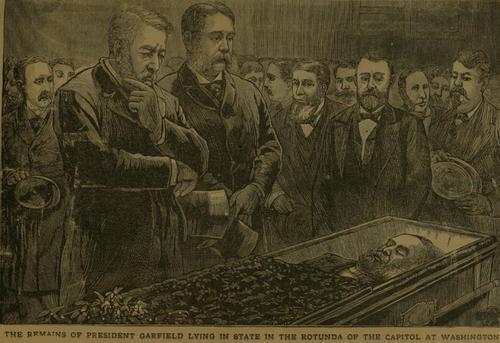
[Secretary of State James G. Blaine, President Arthur, and former President Ulysses S. Grant, view the open casket of President James A. Garfield as he is lying in state in the Capitol Rotunda.]
After taking the oath of office at home in Manhattan in the early hours of September 20, 1881, now-President Arthur proceeded to Washington, D.C., stopping in Long Branch, New Jersey to pay respects to the late President Garfield and his grieving family. Once Arthur succeeded to the Presidency upon Garfield's death, there was no Vice President, no president pro tempore of the Senate, and no Speaker of the House (Congress has not elected its leadership yet), thus, there was no Constitutional line of succession. If something had happened to Arthur at that moment, the United States would have faced an unprecedented Constitutional crisis. As his first act as President, Arthur immediately called the Senate into session in order to select their leadership positions and position someone in the line of succession. Upon arriving in Washington, Attorney General Wayne MacVeagh suggested that Arthur take a second oath of office and he did so at the U.S. Capitol on September 22nd, in the presence of Garfield's Cabinet, members of Congress, Supreme Court Justices, and former Presidents Grant and Hayes.
Americans worried about the former machine politician's integrity were transformed quickly as Chester Arthur underwent something of a transformation himself. Widely considered a lapdog of New York's Roscoe Conkling, Arthur broke ranks with the party boss and pushed for the same civil service reform championed by James Garfield prior to the assassination. Arthur's former associates in the New York Republican Party were disappointed when he declined their requests for political favors. One former colleague sadly reported, "He isn't 'Chet' Arthur anymore. He's the President." Arthur found that the transformation was almost automatic and out of his control, noting that "Since I came here I have learned that Chester A. Arthur is one man and the President of the United States is another." His old benefactor, Conkling, was one critic of the new President, complaining "I have but one annoyance with the Administration of President Arthur and that is, in contrast with it, the Administration of Hayes becomes respectable, if not heroic." Arthur signed the Pendleton Act in 1883 which created a modern civil service system and eliminated the spoils system that had long dominated American politics. This reform, which Conkling called "snivel service" was the final break between the longtime friends and colleagues.
To the American people, the great surprise of an Arthur Administration was the fact that it was clean, honest, and efficient. Arthur helped lift the gloomy moods that had shadowed Washington throughout the Civil War, Lincoln's assassination, Reconstruction, the corruption of the Gilded Age, the wildly controversial Election of 1876, and Garfield's assassination. His popularity rose throughout his term and most critics focused on his lavish entertainment or the fact that he was notoriously late for meetings and seemed bored or lethargic at times. He often procrastinated -- as a White House clerk once said, "President Arthur never did today what he could put off until tomorrow." Still, most Americans were happy with President Arthur and echoed the thoughts of Mark Twain who said, "I am but one in 55 million; still, in the opinion of those one-fifty-five-millionth of the country's population, it would be hard to better President Arthur's Administration."
He was bored, though. President Arthur didn't like being President. He enjoyed the entertaining dinners that he could throw and loved public events or ceremonies that allowed him to meet the people of the United States, but the desk work was tedious and he wasn't interested in policy. Arthur stayed up late and seemed to vacation often, which perplexed many people because it was said that he was constantly exhausted. What they didn't know was that from almost the time he became President, Chester Arthur was dying. In 1882, he was diagnosed with Bright's disease, a fatal kidney ailment at the time. Despite reports that he was suffering from the disease, Arthur hid it from the public, desperately protecting his privacy, as always. Arthur's distaste for the Presidency probably stemmed in part from depression triggered by the Bright's disease. At times, Arthur suffered from debilitating illness and it was always covered with a story about the President catching a cold during a fishing trip or spending too much time in the sun while hunting. In a letter to his son, Alan, in 1883, the President confided, "I have been so ill that I have hardly been able to dispose of the...business before me."
Despite his popularity, Republican leaders opposed Arthur's nomination for a term as President in his own right in 1884. The man who opposed it most, however, was the President himself, who stated "I do not want to be reelected." Not only was he disinterested in a second term, but he knew very well that there was a possibility he might not even survive to the end of his current term. He did, and after attending the inauguration of his successor, Grover Cleveland, on March 4, 1885, Arthur returned home to New York City where his health rapidly declined. The former President was aware that he was dying and made plans for a relatively quiet retirement, deciding to practice law, but doing very little work due to his health. When asked about his future, Arthur said, "There doesn't seem anything for an ex-President to do but to go out in the country and raise big pumpkins." On November 16, 1886, Arthur suffered a stroke that paralyzed his left side. Gravely ill, he called his son to his bedside the day before his death and had all of his public and private papers stuffed into trash cans and burned. On November 18, 1886, the 57-year-old former President died in the same place he became President just five years earlier, 123 Lexington Avenue in New York City. After a quiet funeral at the Church of Heavenly Rest on Fifth Avenue in New York, Arthur's remains were buried next to his beloved wife at Rural Cemetery in Albany, New York.
•••
When President Arthur had many of his personal papers burned prior to his death, he eliminated one of the best sources of information about his life and career for future historians. With a thin resume and a fairly uneventful Presidency, there wasn't much public information about his career, either. This leaves us with very little to remember Chester Alan Arthur by. Research on his life -- particularly his personal life -- is difficult, and Arthur would have appreciated that. During his Presidency, leaders of the temperance movement called on Arthur and urged him to follow the non-alcoholic lifestyle led by President Hayes and his teetotaler wife, who became known as "Lemonade Lucy".
Arthur's response: "Madam, I may be President of the United States, but my private life is nobody's damn business."
And so it isn't.
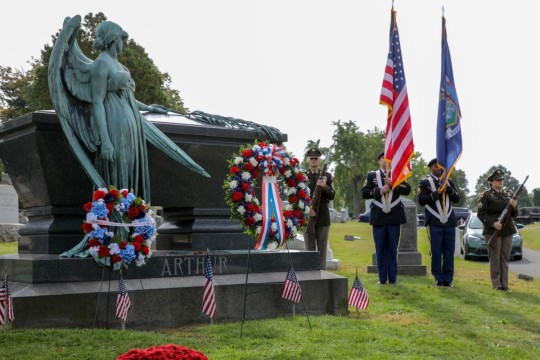
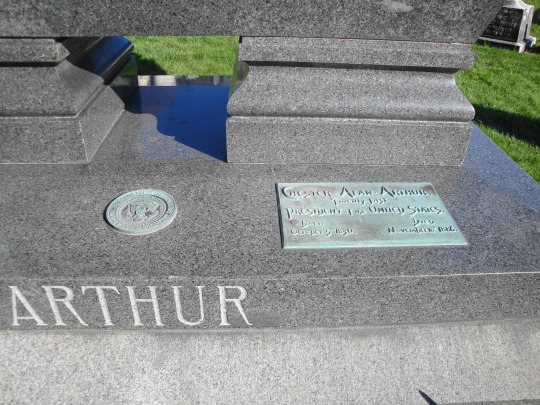
#History#Presidents#Chester A. Arthur#Chester Alan Arthur#President Arthur#Arthur Administration#Presidential History#Presidency#Writings#Essays#Original Essays#The Elegant Mr. Arthur#James A. Garfield#President Garfield#Garfield Administration#Presidential Assassinations#Assassination of James Garfield#Garfield Assassination#1880 Election#Election of 1880#Gilded Age#New York Politics#Charles Guiteau#Roscoe Conkling#Vice Presidents#Vice President Arthur#Presidential Succession
39 notes
·
View notes
Text



Judy Kuhn i lov u😭🤲
#musical#assassins#assassins musical#stephen sondheim#sara jane moore#charles guiteau#lynette fromme#giuseppe zangara#judy kuhn
39 notes
·
View notes
Text
I know I was shitting on ChatGPT yesterday but I realized the best, nay, only use for its soulless grifter mindset




57 notes
·
View notes
Text
sorry
31 notes
·
View notes
